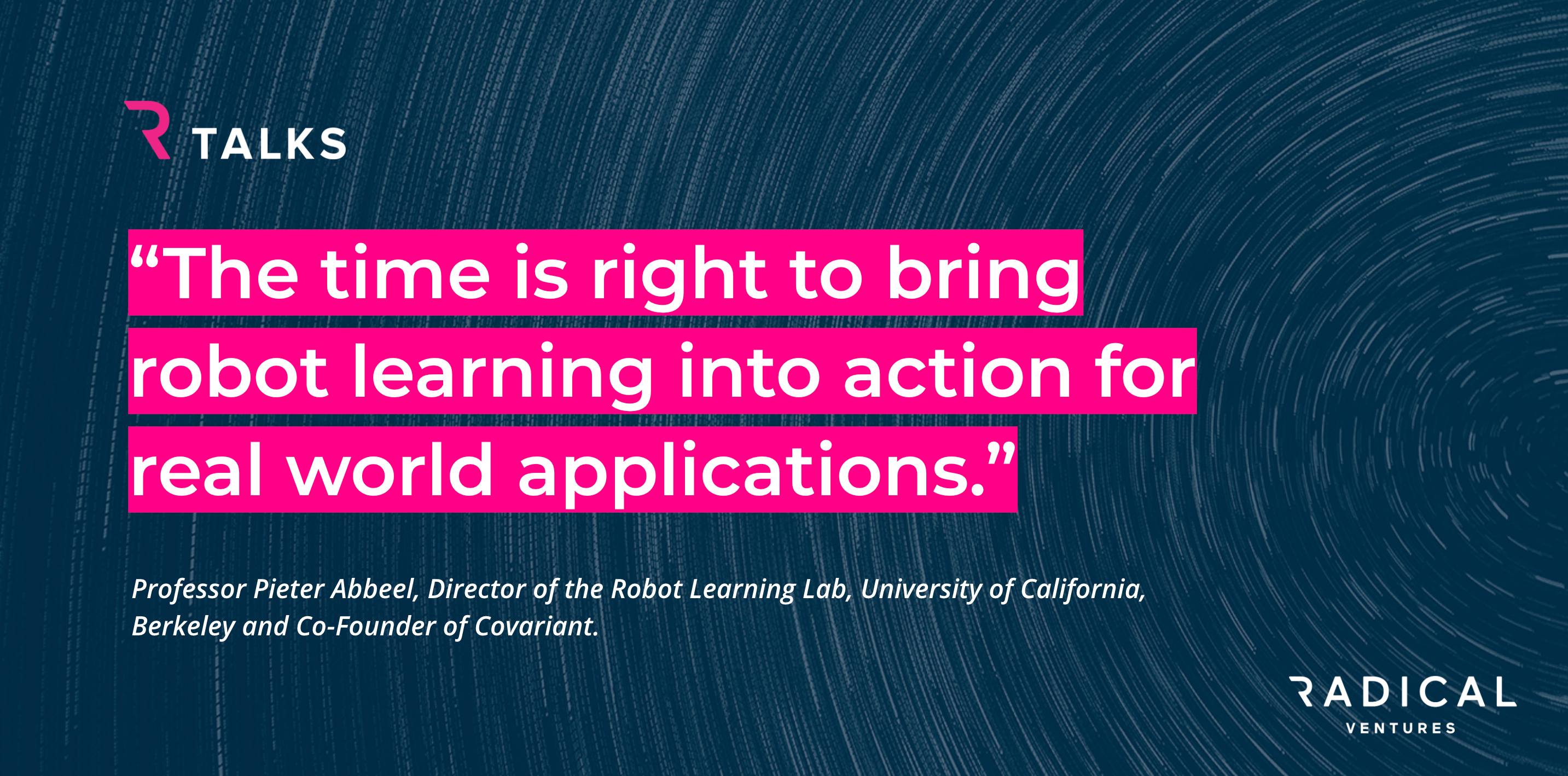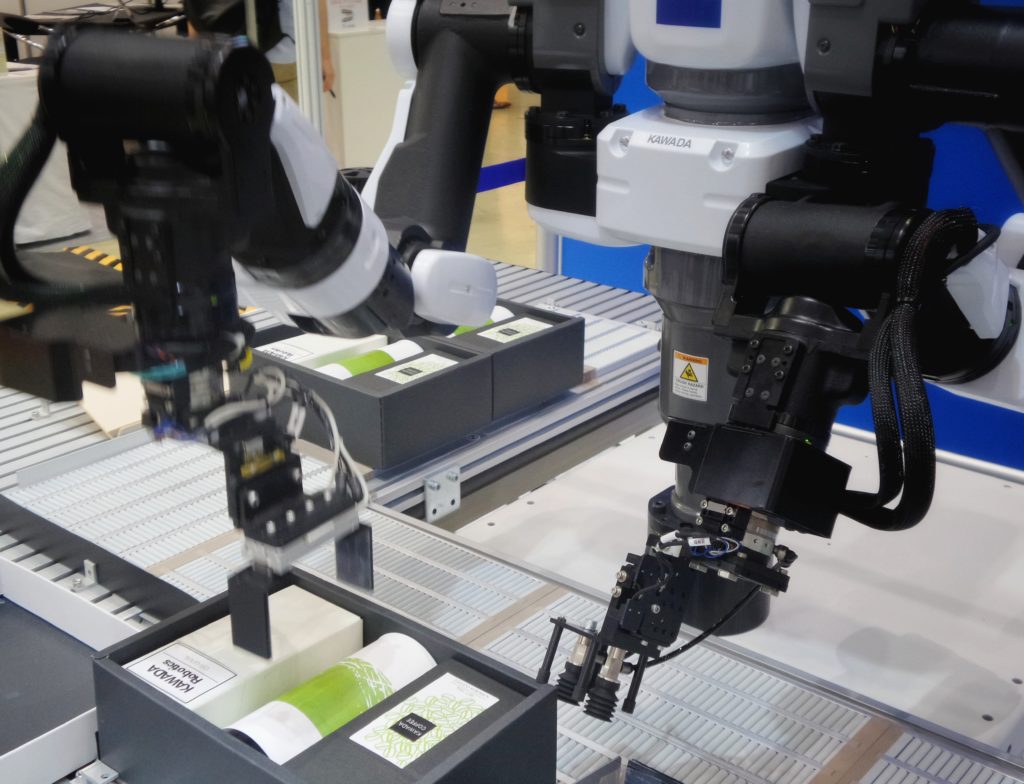COVID-19 has us thinking a lot about the complex systems that underpin the infrastructure of modern life that most people took for granted in the ‘Before Times’, back at the start of the year. In 2020, doctors, nurses and other frontline medical workers were forced to wear garbage bags for lack of personal protective equipment while grocery store shelves emptied around the world. Meanwhile, a surplus of 3.7 million gallons of milk and 750,000 eggs were dumped and destroyed daily. The pandemic stress-tested the global supply chain. And where there were weaknesses, the chain broke and the exchange of goods that supports modern life ground to a halt. Shipments were delayed, production fell short and the world economy held its breath.

In our latest Radical Talks podcast, Pieter Abbeel, an innovator at the cutting edge intersection of AI and robotics, discusses how COVID-19 is accelerating the adoption of automation to shore up the global supply chain of the future. Widely regarded as the world’s pre-eminent AI robotics researcher, Pieter is director of the Robot Learning Lab at the University of California, Berkeley where he is a Professor. Pieter is also co-founder of Covariant – a robotics software platform that develops and applies new types of Artificial Intelligence (Radical Ventures is proud to be an investor in Covariant). The podcast also explores the current state of the art in robotics, how AI has changed the field of automation, and what the future of ‘smart robots’ looks like. Pieter cogently explains in lay terms what types of AI are being used in robotics and how that AI actually works.
Industrial robots have added significant value to the manufacturing and logistics industry since the 1960s, but they have only achieved a fraction of their potential. Today, most industrial robots are pre-programmed to complete narrow tasks in controlled environments. More complex and unpredictable tasks that require human hands, such as picking, placing and unloading, have been notoriously difficult to automate. When the pandemic struck and the density of workers in warehouses and factories had to be reduced, it was these services that were most vulnerable to failing.
Automating this work requires advanced AI that can understand, learn and adapt. Covariant is one of the few companies addressing this enormous challenge, and its solution leads the field by applying deep reinforcement learning — the “Covariant Brain” — that enables robots to see, reason and act autonomously in the real world in order to ‘think’ for themselves and learn from each other’s experiences in real-time. Robots powered by Covariant learn generalizable abilities such as robust 3D perception, physical affordances of objects, few-shot learning and real-time motion planning which gives them the intelligence to learn how to manipulate new objects they have never seen before in environments where they have never operated.
The pandemic has accelerated the extraordinary volume of goods that rely upon the global supply chain. In 2019, retail e-commerce sales worldwide amounted to USD $3.53 trillion and e-retail revenues are projected to grow to USD $6.54 trillion by 2022. Covariant offers a glimpse of how manufacturers may deliver on this staggering demand, as they look to intelligently reinforce operations on the factory and warehouse floor.
There are many lessons to be learned from 2020, but building resiliency into the global supply chain must be near the top of the list. Ultimately, it will be companies like Covariant, building smarter robots, that will ensure the future stability of the global economy at times of crisis.
AI News This Week
-
Synex Medical Raises US $5.25 Million Seed Round for Health Monitoring Technology (Betakit)
Synex Medical, a Radical portfolio company, is building the next generation of non-invasive health monitoring technology using miniaturized MRI and Artificial Intelligence to give people an easy yet data-rich way to get insights on how their bodies are working, including bio-markers like blood glucose. The latest funding was led by Accomplice along with returning investors Radical Ventures and angel investor Naval Ravikant.
-
The Benefits of Artificial Intelligence for Pavement Management (Boston Society of Civil Engineers Section)
In 2017, RoadBotics, a Radical portfolio company, formed a partnership with a Massachusetts-based Civil Engineering firm to bring AI and machine learning to New England. The detailed assessments of roadways provided by RoadBotics are vital to pinpointing precise locations for maintenance and to develop municipal infrastructure plans.
-
Server Inference Chip Startup Untethered From AI Data Movement (The Next Platform)
This week, Radical portfolio AI chip company Untether AI unveiled its tsunAImi accelerator cards powered by its runAI devices, which are the world’s first ‘At-Memory’ chips. Untether AI breaks through the barriers of traditional von Neumann architectures, offering industry-leading compute at lower power consumption and price efficiency. From cloud infrastructure to autonomous vehicles, this breakthrough brings the vast potential of AI to “edge computing” for a breadth of AI applications and research such as NLP, computer vision and recommendation systems. Untether AI’s investors are Radical Ventures, Intel Capital and GM Ventures.
-
Artificial intelligence model detects asymptomatic Covid-19 infections through cellphone-recorded coughs (MIT News)
AI accurately identified 98.5 percent of coughs from people who were confirmed to have Covid-19, including 100 percent of coughs from asymptomatics. The MIT team is working on a user-friendly app which, if FDA-approved and adopted on a large scale, could potentially become a noninvasive pre-screening tool.
-
AI-enabled assistant robot returning to the Space Station with improved emotional intelligence (TechCrunch)
CIMON-2 was launched aboard a SpaceX ISS resupply mission this week. It will support astronauts working in space not only practically, but emotionally as well. The AI-powered robot is designed to retrieve information, keep track of tasks, and curb the emotional impact of social issues that may arise on board the space station.
Radical Reads is edited by Ebin Tomy.

